By freely sharing what we learn, we have built a reputation as thought leaders who translate ideas into action and action into results. You can search through our collection of standalone resources below.
Filter Results by Solution:
2022 | Global Health
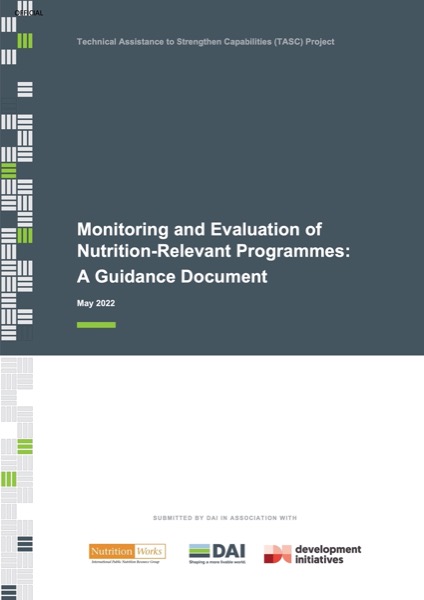 This document has been developed by the Technical Assistance to Strengthen Capabilities project (TASC) team to support the monitoring and evaluation (M&E) of nutrition-relevant Foreign, Commonwealth and Development Office programmes. This includes guidance on how to support more accurate measurement of programme outcomes and impacts for all target populations, including the most marginalised women and children; and to […]
This document has been developed by the Technical Assistance to Strengthen Capabilities project (TASC) team to support the monitoring and evaluation (M&E) of nutrition-relevant Foreign, Commonwealth and Development Office programmes. This includes guidance on how to support more accurate measurement of programme outcomes and impacts for all target populations, including the most marginalised women and children; and to […]2021 | TASC
 Les systèmes nationaux d’information pour la nutrition impliquent la collecte, l’analyse et l’interprétation continues des données relatives à la nutrition. Ils sont essentiels pour évaluer l’état nutritionnel actuel et changeant des populations, suivre l’évolution des actions et hiérarchiser les efforts visant à améliorer la nutrition.Ces études de cas mettent en lumière des exemples provenant […]
Les systèmes nationaux d’information pour la nutrition impliquent la collecte, l’analyse et l’interprétation continues des données relatives à la nutrition. Ils sont essentiels pour évaluer l’état nutritionnel actuel et changeant des populations, suivre l’évolution des actions et hiérarchiser les efforts visant à améliorer la nutrition.Ces études de cas mettent en lumière des exemples provenant […]2021 | TASC
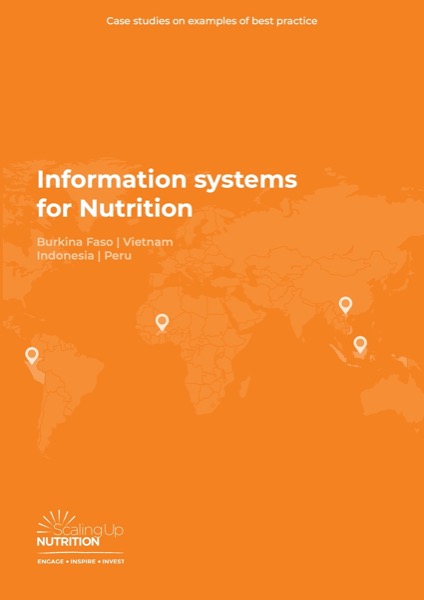 National information systems for nutrition involve the continuous collection, analysis and interpretation of nutrition-related data. They are essential for assessing current and changing nutritional status of populations, tracking the progress of actions, and prioritising efforts towards improving nutrition. These case studies highlight examples from four countries. Each provides an overview of the main characteristics of information systems for nutrition […]
National information systems for nutrition involve the continuous collection, analysis and interpretation of nutrition-related data. They are essential for assessing current and changing nutritional status of populations, tracking the progress of actions, and prioritising efforts towards improving nutrition. These case studies highlight examples from four countries. Each provides an overview of the main characteristics of information systems for nutrition […]2022 | Global Health
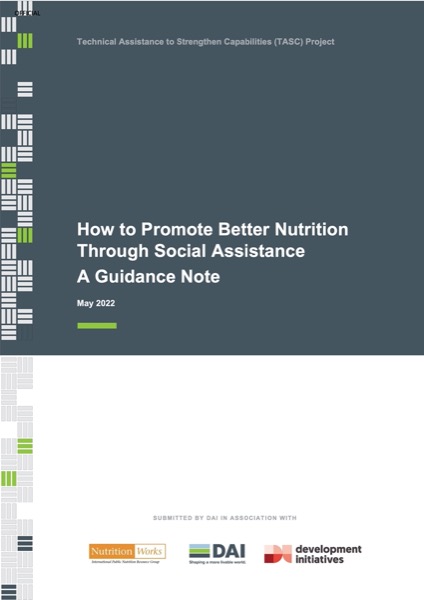 Social assistance is recognised as an important mechanism to support poor and vulnerable members of society and is increasingly being considered as a means of supporting nutritionally at-risk populations. This guidance focuses on the nutrition sensitivity of social assistance and is intended as a resource that can support practitioners at any point in the programme cycle. The primary audience […]
Social assistance is recognised as an important mechanism to support poor and vulnerable members of society and is increasingly being considered as a means of supporting nutritionally at-risk populations. This guidance focuses on the nutrition sensitivity of social assistance and is intended as a resource that can support practitioners at any point in the programme cycle. The primary audience […]2021 | TASC
2021 | TASC
2022 | Global Health
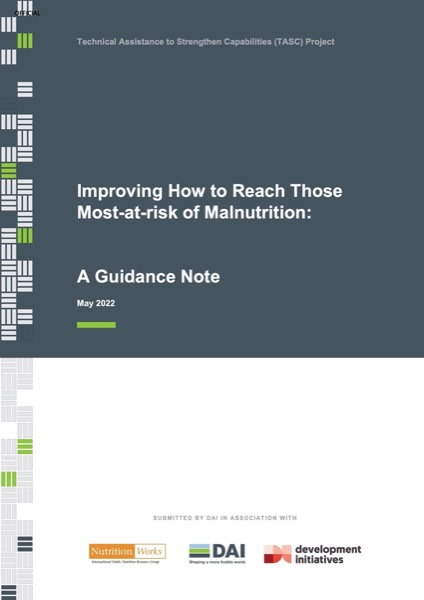 This guidance offers practical information on 1) how to identify population groups that are most nutritionally at-risk and 2) how to better address the nutritional needs of identified at-risk groups. It is organised according to key phases of the project cycle and includes annexes with further resources and analysis on at-risk groups and strategies to reach them.
This guidance offers practical information on 1) how to identify population groups that are most nutritionally at-risk and 2) how to better address the nutritional needs of identified at-risk groups. It is organised according to key phases of the project cycle and includes annexes with further resources and analysis on at-risk groups and strategies to reach them.2022 | Global Health
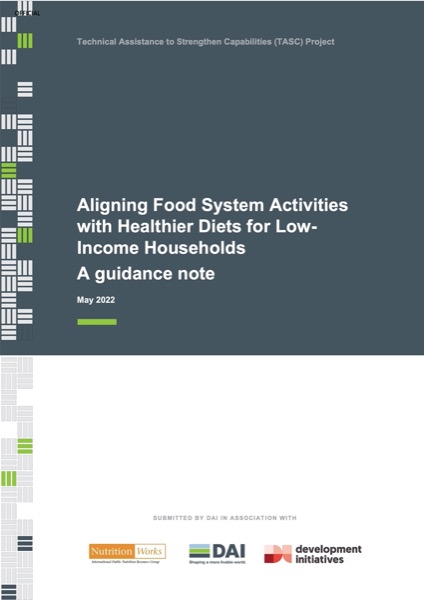 The purpose of this guidance is to support organisations and practitioners involved in food system activities to design programmes and conduct policy engagement to enable the world’s most vulnerable people to eat more diverse, healthier diets, while also meeting climate and/or economic objectives. In so doing, it aims to increase the efficiency and effectiveness of food system activities […]
The purpose of this guidance is to support organisations and practitioners involved in food system activities to design programmes and conduct policy engagement to enable the world’s most vulnerable people to eat more diverse, healthier diets, while also meeting climate and/or economic objectives. In so doing, it aims to increase the efficiency and effectiveness of food system activities […]2021 | TASC
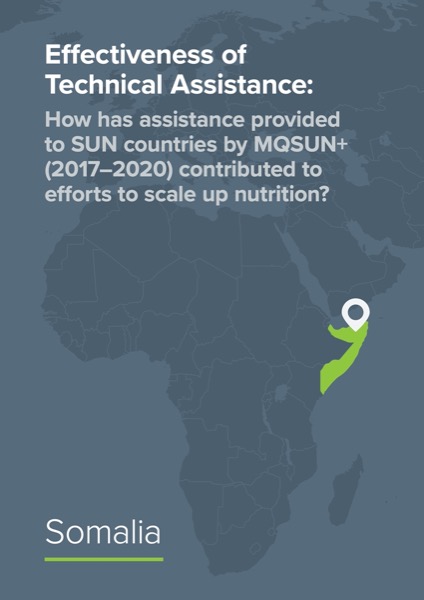 The Technical Assistance for Nutrition (TAN) programme is a 6.5-year (May 2015–November 2021), £35.8 million Foreign, Commonwealth and Development Office (FCDO)-funded initiative that provides support to the Scaling Up Nutrition (SUN) Movement and FCDO staff. The Maximising the Quality of Scaling Up Nutrition Plus (MQSUN+) programme was a Technical Assistance (TA) facility within the larger […]
The Technical Assistance for Nutrition (TAN) programme is a 6.5-year (May 2015–November 2021), £35.8 million Foreign, Commonwealth and Development Office (FCDO)-funded initiative that provides support to the Scaling Up Nutrition (SUN) Movement and FCDO staff. The Maximising the Quality of Scaling Up Nutrition Plus (MQSUN+) programme was a Technical Assistance (TA) facility within the larger […]Further Refine Results by Document Type:
2022 | Global Health
 This document has been developed by the Technical Assistance to Strengthen Capabilities project (TASC) team to support the monitoring and evaluation (M&E) of nutrition-relevant Foreign, Commonwealth and Development Office programmes. This includes guidance on how to support more accurate measurement of programme outcomes and impacts for all target populations, including the most marginalised women and children; and to […]
This document has been developed by the Technical Assistance to Strengthen Capabilities project (TASC) team to support the monitoring and evaluation (M&E) of nutrition-relevant Foreign, Commonwealth and Development Office programmes. This includes guidance on how to support more accurate measurement of programme outcomes and impacts for all target populations, including the most marginalised women and children; and to […]2016 | Health Partners International
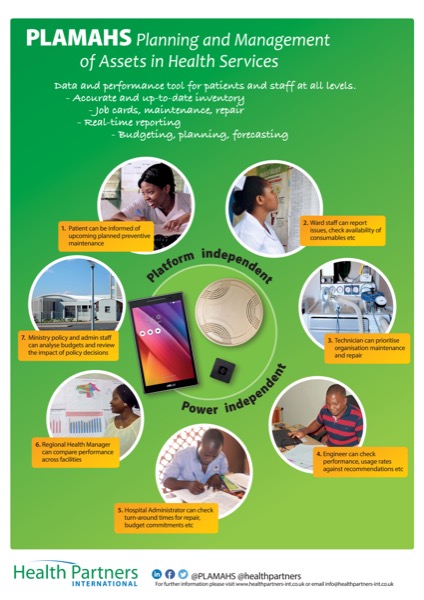 HPI presented this poster at the Mechanical Bioengineering Conference under the Appropriate Healthcare Technologies for Low Resource Settings track, held by the Institution of Engineering and Technology. The AHT Conference brought together healthcare technologists, clinicians, researchers and public bodies from around the world to explore effective engineering solutions to meet the healthcare problems in low resource settings. PLAMAHS reports on […]
HPI presented this poster at the Mechanical Bioengineering Conference under the Appropriate Healthcare Technologies for Low Resource Settings track, held by the Institution of Engineering and Technology. The AHT Conference brought together healthcare technologists, clinicians, researchers and public bodies from around the world to explore effective engineering solutions to meet the healthcare problems in low resource settings. PLAMAHS reports on […]2021 | TASC
 Les systèmes nationaux d’information pour la nutrition impliquent la collecte, l’analyse et l’interprétation continues des données relatives à la nutrition. Ils sont essentiels pour évaluer l’état nutritionnel actuel et changeant des populations, suivre l’évolution des actions et hiérarchiser les efforts visant à améliorer la nutrition.Ces études de cas mettent en lumière des exemples provenant […]
Les systèmes nationaux d’information pour la nutrition impliquent la collecte, l’analyse et l’interprétation continues des données relatives à la nutrition. Ils sont essentiels pour évaluer l’état nutritionnel actuel et changeant des populations, suivre l’évolution des actions et hiérarchiser les efforts visant à améliorer la nutrition.Ces études de cas mettent en lumière des exemples provenant […]2021 | TASC
 National information systems for nutrition involve the continuous collection, analysis and interpretation of nutrition-related data. They are essential for assessing current and changing nutritional status of populations, tracking the progress of actions, and prioritising efforts towards improving nutrition. These case studies highlight examples from four countries. Each provides an overview of the main characteristics of information systems for nutrition […]
National information systems for nutrition involve the continuous collection, analysis and interpretation of nutrition-related data. They are essential for assessing current and changing nutritional status of populations, tracking the progress of actions, and prioritising efforts towards improving nutrition. These case studies highlight examples from four countries. Each provides an overview of the main characteristics of information systems for nutrition […]2021 | TASC
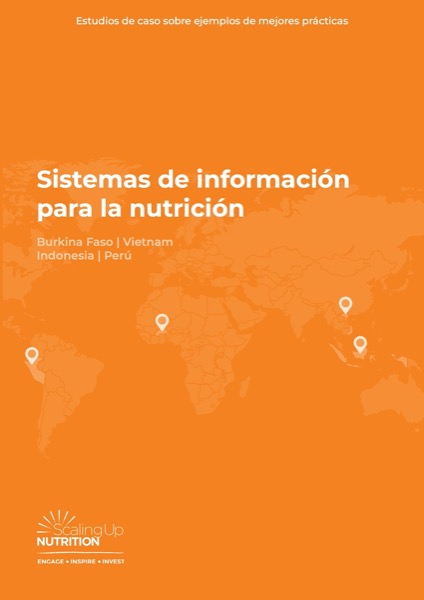 Los sistemas nacionales de información para la nutrición incluyen la recopilación, el análisis y la interpretación continua de datos relacionados con la nutrición. Son esenciales para evaluar el estado nutricional actual y cambiante de las poblaciones, monitorear el progreso de las acciones y priorizar los esfuerzos para mejorar la nutrición.Estos estudios de caso destacan ejemplos de cuatro países
Los sistemas nacionales de información para la nutrición incluyen la recopilación, el análisis y la interpretación continua de datos relacionados con la nutrición. Son esenciales para evaluar el estado nutricional actual y cambiante de las poblaciones, monitorear el progreso de las acciones y priorizar los esfuerzos para mejorar la nutrición.Estos estudios de caso destacan ejemplos de cuatro países
DII is an equal opportunity/affirmative action employer with a commitment to diversity. All qualified applicants will receive consideration for employment without regard to race, color, religion, sex, protected veteran status, disability status, sexual orientation, gender identity or national origin. In compliance with the Americans with Disabilities Act, DII will provide reasonable accommodation to qualified individuals with disabilities. To request a potential accommodation, please send an e-mail to accommodationrequest@dii.com. Related Resources | Modern Day Slavery and Anti-Human Trafficking | UHC Transparency in Coverage